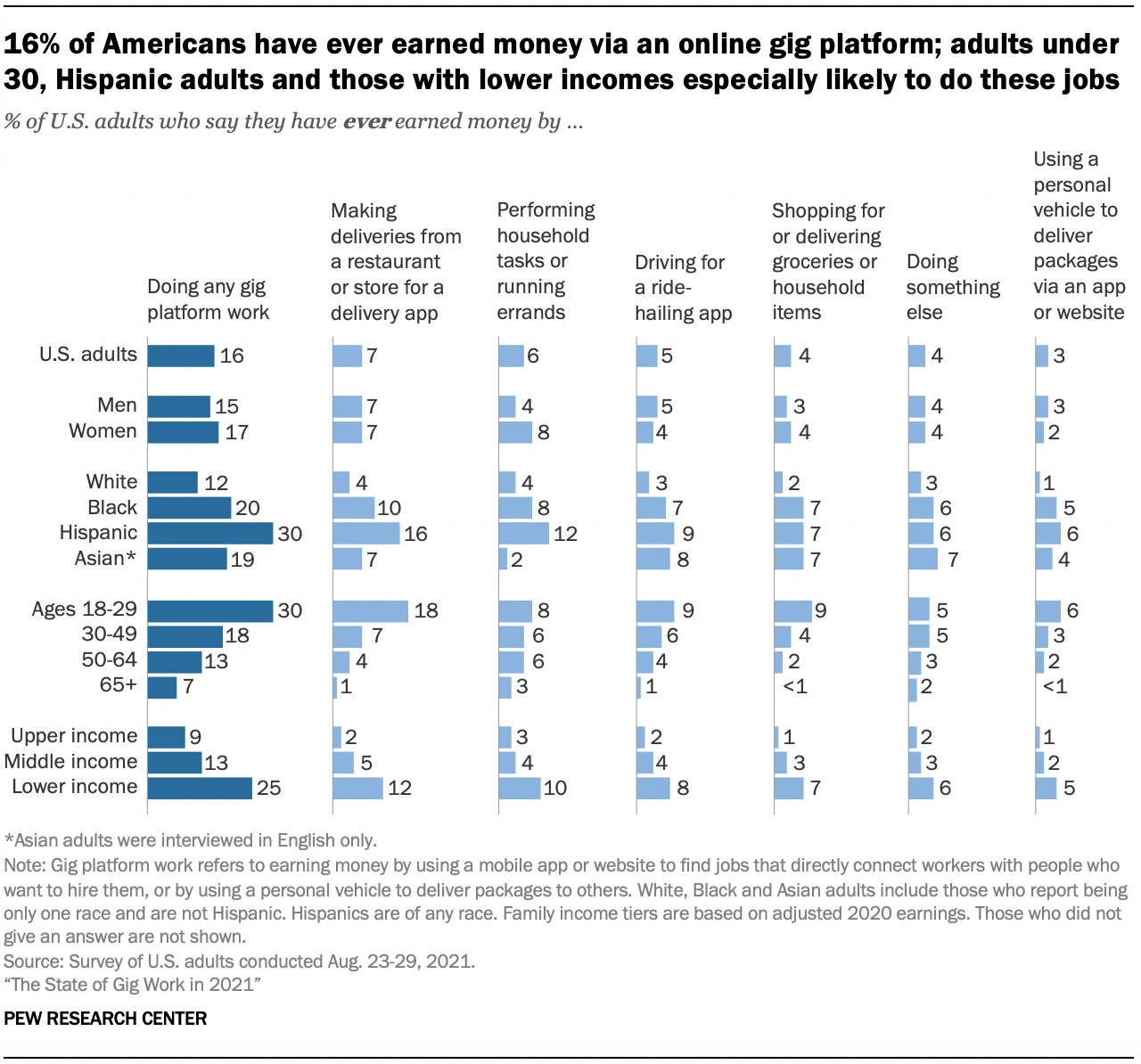The Dark Side Of The Gig Economy: The Truth About Part-Time Work
Is part-time and gig work becoming the new normal? Are traditional jobs ending? Here is a look at the dark side of the gig economy and the truth about part-time work.
Is finding a traditional 9-5 job providing benefits becoming more difficult? Is transitioning to more part-time and contract work in employers' financial interests? How has the gig economy encouraged the transition to part-time jobs? Here is a look at the dark side of the gig economy and the truth about part-time work.
What Is The Gig Economy?
Investopedia defines the gig economy as:
“A gig economy is a labor market that relies heavily on temporary and part-time positions filled by independent contractors and freelancers rather than full-time permanent employees.”
The gig economy consists of non-traditional jobs. These are jobs where workers do not receive benefits, time off, vacation days, and other incentives often associated with traditional employment. The workers of gig jobs are not employees but independent contractors.
Benefits Of The Gig Economy
Gig workers can create their schedules. The trade-off of less stable pay is more freedom and flexibility for gig workers.
Negatives Of The Gig Economy
While the companies that a gig worker may market to the workers are “small business owners” or “entrepreneurs,” they are merely independent contractors. It was common for some gig economy companies to market working for them by saying, “You are your own boss.”
Gig workers are responsible for paying for gas, insurance, and other factors that an employer may typically provide. Gig workers must calculate their input costs to determine their approximate hourly rate. Gas and car maintenance would be an input cost for delivery and driving gig jobs.

How Is The Gig Economy Displacing Traditional Jobs?
A contractor is different from a full-time employee. As more employers transition to hiring part-time or contract workers, they do not need to provide employee benefits. It saves the employers money. The contractor or part-time employee must then cover the costs.
If a gig worker delivers food (GrubHub or UberEats), drives people around (Uber or Lyft), or freelances jobs on UpWork or other sites, companies take a percentage from each job.
Normalization Of Part-Time And Gig Jobs
In college, I worked random sales jobs. I learned the basics of sales and learned about a sales funnel. The companies never allowed me to work more than thirty hours a week. The exception was for one higher-end product I sold. During the height of the holiday season, I could do more than thirty hours.
Then, in grad school, I delivered for GrubHub to make extra money when my schedule allowed.
These types of jobs are becoming the new regular jobs. An employer only needs to pay the minimum benefits, if any at all. Just allow thirty minutes for a lunch break.
The employee is then more responsible for what happens compared to the employer. If the part-time employee does not work well, the employer can fire them and replace them with someone else.
There is no loyalty in the gig and part-time economy like there used to be with past generations. It used to be that you could stay at a company. Work your way up. Then, retire with a pension and stock options and be recognized for your loyalty to the company you worked for.

These part-time and gig jobs often do not pay enough to cover the rising living costs, even if someone works a hundred hours a week working two or three part-time or gig jobs.
Creation Of Three Job Classes
There are now job classes: full-time, part-time, and gig jobs.
The people who can get a full-time job will likely work in tech or some STEM field. The employer may be larger. The employees can still receive benefits.
People who work a service job may start full-time but then have their hours reduced to part-time or less. This would happen because the employer cares more about their bottom line and does not want to pay for benefits to their employees. Reducing their hours is a simple solution. Loyalty is dead.
Most gig workers, except for some freelance jobs, are just the modern version of the service economy. Gig workers deliver food to people who order using an app. They drive people to where they need to go. They deliver groceries to people’s homes.
As more jobs become part-time and gig jobs due to the gig economy, which went mainstream in the 2010s with Uber and GrubHub, there will be fewer traditional jobs. It will be in most employers’ interests to pay their employees, now contractors, less while not having to provide them with benefits (health, 401k, et cetera).
Fewer Hours And Less Pay
As people work fewer hours and earn less, they must find a way to make enough money to pay their bills. This will add to the death spiral of falling into the debt trap. People must devise a solution to increase their income to leave the chaotic gig economy.
The Economic Policy Institute summarizes critical findings on why part-time work is becoming the “new normal.” Five key points from the Economic Policy Institute’s report are:
“The structural nature of today’s involuntary part-time employment is evident in the decrease in workers who say they are involuntarily part time due to slack work.”
“Involuntary part-time work and its growth are concentrated in several industries that more intensively use part-time work, specifically, retail and leisure and hospitality.”
“The service occupations (e.g., healthcare support, food preparation, building and grounds maintenance, personal care, etc.) contribute the most to involuntary part-time employment, followed by sales.”
“The biggest disadvantage that part-time workers face is their relatively lower rates of pay and their benefit coverage.”
“Part-time workers must navigate varied and unpredictable hours.”

Part-time jobs are here to stay, or as the Economic Policy Institute called them, the “new normal.” The trend toward part-time and gig work has only continued since the Economic Policy Institute published its report in 2016.
Dark Side Of Gig Jobs And Part-Time Work
The dark side of gig and part-time work is that they created the hustle culture. A person must always be hustling to survive and get ahead. There are no regular hours. There are no benefits. There is no job security.
Hustle or get kicked out by your landlord and become homeless. Gig jobs and part-time work also require the workers to find new work. There is nothing steady about most gig jobs or part-time work. The result is that people must work multiple jobs to survive.
The good news is there are solutions. But, they require self-responsibility, action, and time to see results.
Solutions
Online Business
People who are stuck working part-time and gig jobs can work to build up savings. They can then start an online business. By utilizing social media, they can work to build an audience and email list and find ways to monetize content in different ways.
Some risks come with running a business. Starting an online business is easier today than starting a brick-and-mortar business. Come up with a name. See if the domain is available. Start small. Be consistent. Use one or two main social media platforms to grow an audience.
While growing an audience, work to develop a product or service to sell to customers. Use the sales skills you may have learned while working a part-time or gig job.
Related - 12 Reasons Young People Should Not Go To College
Learn A Trade
Another option could be to go into the trades. There is a labor shortage in the trades since the younger generations were encouraged to attend college. Learn a trade if you are good with your hands.
Invest In Yourself
You have options. Discover your strengths. Find a way to monetize them. It is possible to leave part-time and gig jobs. It will require you to invest in yourself and to know yourself. It is up to you whether or not you become stuck in the modern gig economy or working a dead-end part-time job. Take action to change your circumstances by focusing on yourself.
Secure Single’s Algorithm recommends:
3 Reasons Why Millennials And Gen-Z Are Moving Back In With Their Parents
Doomsday Prepping (Part 1): 7 Reasons Why It Is Making A Comeback
Mastering The Art Of Sales: The Power Of Grifting, Marketing, And Propaganda In Business
Summary
Part-time and gig jobs are slowly becoming the new standard bearer for the jobs market. People must be creative, take calculated risks, and embrace the Internet to leave the part-time and gig economy.
Would you like to boost your confidence, happiness, and prosperity? Subscribe to Secure Single's Substack for free or with a paid subscription.
What do you think of the gig economy?
👉Help spread the word by sharing this post with your friends! If you found it on Substack, show your love by clicking the ❤️ button so more people can find this content!🙌







I feel that the system needs to be reformed such that gig or part-time workers are paid higher salaries and receive benefits from their respective employers. Apart from this, companies and employers in general must hire more full-time employees and pay them accordingly, instead of trying to cut costs by opting for part-time or contract workers.
For all this to happen, there needs to be a strong push from the masses for actual, proper wealth distribution from the rich class to the rest of society, and for the government to apply pressure to the corporations to distribute a greater share of the profits gained to their respective workers, instead of being accumulated in the hands of those at the top. The government must also spend more towards improving people's socioeconomic statuses, in order to strengthen their financial security.
This would be a challenging and long process, given that many governments and their societies are deeply entrenched in this one-sided, solely profit-driven, global neoliberal capitalist system. But it can't be denied that this system, is indeed the root cause of many of the problems in society, especially in terms of socioeconomic issues, quality of life, earning decent income, job opportunities, etc.
And therefore, the only true way for things to change for the better is to tackle the root cause of these problems, that is by reforming the system itself.